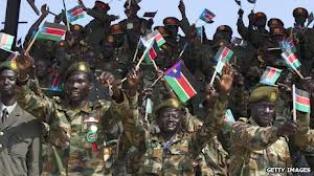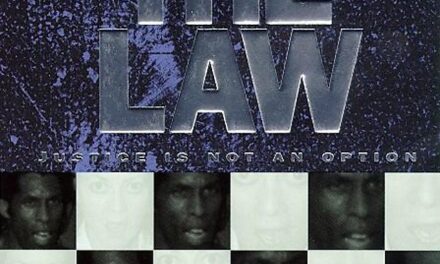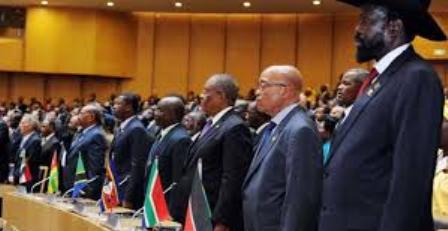By Human Rights Watch Press
Published September 13, 2013
 South Sudan‘s army has killed and committed serious violations against civilians in Jonglei State in the context of a counterinsurgency campaign that has forced thousands of people to flee their homes and become more vulnerable to attack from rival ethnic groups.
South Sudan‘s army has killed and committed serious violations against civilians in Jonglei State in the context of a counterinsurgency campaign that has forced thousands of people to flee their homes and become more vulnerable to attack from rival ethnic groups.
In a statement issued on September 13, 2013, Human Rights Watch has called upon South Sudan to ‘hold all abusive soldiers to account and bolster military and civilian justice to curb further violations’.
RELATED: Kenyan Protesters’ Use of Pigs, Vultures and Death Put Police in a Dilemma
They are Killing Us: Abuses Against Civilians in South Sudan’s Pibor County, a 45-page report by Human Rights Watch, documents 24 incidents of unlawful killing of almost 100 members of the Murle ethnic group between December 2012 and July 2013, constituting serious violations of international humanitarian and human rights law. Murder and deliberate targeting of civilians during an armed conflict constitute war crimes.
The report also describes how the Sudan People’s Liberation Army (SPLA) soldiers burned and looted homes, physically and verbally abused civilians, and destroyed schools, churches, and the compounds of aid agencies providing life-saving assistance.
“Soldiers should be protecting Murle civilians in Jonglei state from the fighting and the ethnic conflict,†Daniel Bekele, Africa director at Human Rights Watch, says. “Instead, the army has been killing these vulnerable people and driving terrified men, women, and children into the jaws of danger.”
A series of unlawful killings, including of women, children, and people with mental illnesses have caused widespread terror among the Murle, exacerbating the perception that they are being targeted as an ethnic group. The incidents occurred against a backdrop of a conflict between South Sudan’s army and a Murle rebel group. Soldiers and specially trained “auxiliary†police in Pibor county of Jonglei state unlawfully killed more than 70 Murle civilians and up to 24 ethnic Murle members of the security forces, in serious violations of international humanitarian and human rights law.
Although the UN Mission in South Sudan (UNMISS) provided safe haven to scores of civilians in its compounds during attacks on civilians by security forces in the towns of Gumuruk and Pibor, Human Rights Watch says, their lack of intervention during serious abuses over many months has undermined Murle confidence in the UN peacekeepers.”
RELATED: Sudan Shouldn’t Strip Citizenship Arbitrarily
Research by Human Rights Watch in Juba and Jonglei in June and July 2013 found that soldiers had repeatedly targeted civilians beginning in December 2012. In one incident, on December 4,2012,soldiers executed 13 civilians in the village of Lotho.
On January 27, 2013, soldiers opened fire on civilians and burned homes in the town of Pibor following an altercation between former Murle rebels and soldiers, killing up to seven civilians. On May 26, soldiers attacked civilians in the town of Manyabol and executed 12 men, including three chiefs, causing the entire civilian population of Manyabol to flee.
The lack of military judge advocates and civilian judicial personnel in Jonglei has long been an obstacle to justice for victims of serious violations. The army should report on its progress in ending violations and improving justice to South Sudan’s Legislative Assembly and the media.
The UN mission, which began patrolling more extensively in August 2013, should increase the frequency and coverage of patrols in the upcoming dry season, and be prepared to use force to protect civilians under imminent threat, including from government soldiers. The mission should have publicly condemned soldiers’ violations much earlier and should urgently increase its human rights monitoring and public reporting to help end the abuses, Human Rights Watch says.
Officials of the UN mission told Human Rights Watch that peacekeepers lack helicopters and high-quality military equipment to enable them to provide better protection. The UN and countries that contribute troops to the mission should ensure that the mission has sufficient equipment to do its job.
The soldiers’ abuses have taken place in an environment of cyclical violence and lawlessness in Jonglei. Over the past three years ethnic conflict has killed thousands of people from Jonglei’s Dinka Bor, Lou Nuer, and Murle ethnic groups. The government has repeatedly failed to investigate those responsible for the violence or to protect communities adequately from attacks and counter-attacks.
RELATED: How Nelson Mandela and Thabo Mbeki’s ANC Betrayed South Africans
South Sudanese authorities should also investigate the brutal ethnic conflict in Jonglei, which continued amid the counterinsurgency, and ensure that security forces adequately and impartially protect all ethnic communities from attacks, Human Rights Watch says.
The government should investigate and prosecute ringleaders responsible for mobilizing the ethnic attacks. Authorities should also arrange for an independent and comprehensive investigation into the ethnic violence. The government agreed in 2012 to arrange for an investigation, but did not follow through. The investigation should look into the allegations of government support for ethnic fighters and should assess the adequacy of efforts to protect communities across Jonglei state, and should be assisted by international experts, Human Rights Watch says.
“The government needs to fulfill its responsibility to protect civilians across South Sudan,” Bekele says. “It should end abuses by its own forces, improve protection of civilians from violence, and bring justice for deadly ethnic attacks.”
RELATED: Large-Scale Graft Deprives Ugandans of Basic Rights




